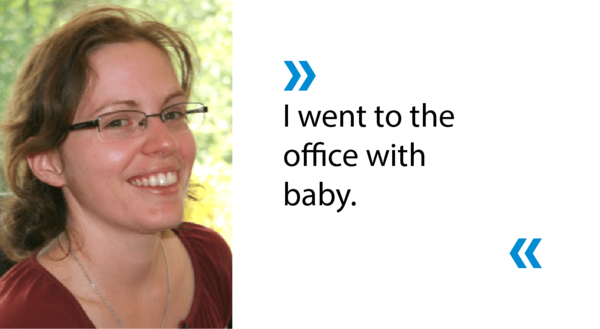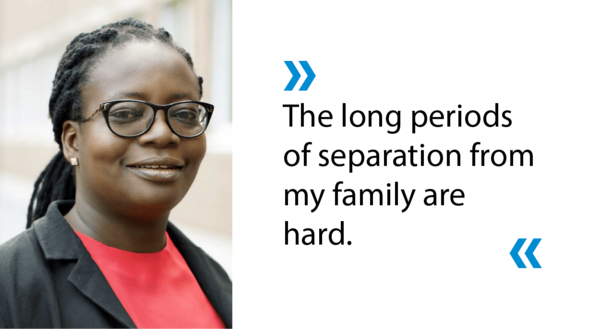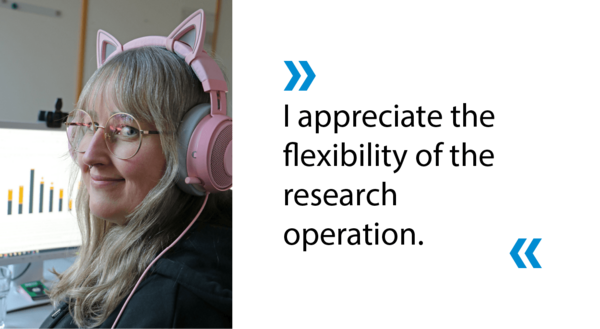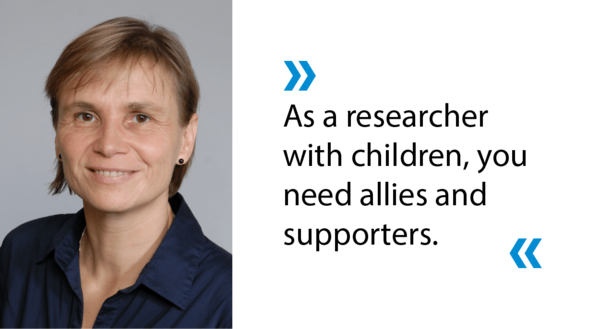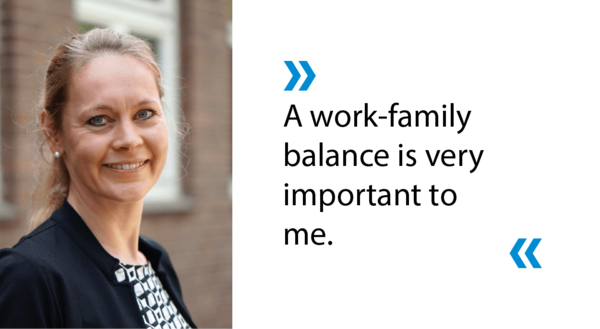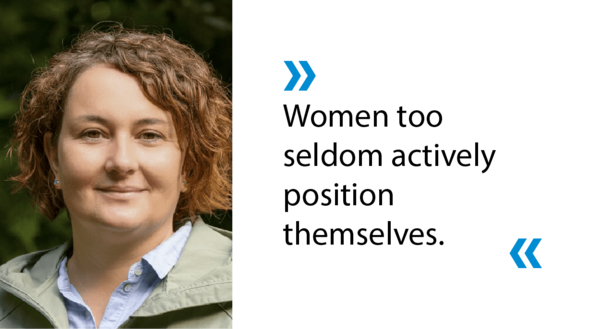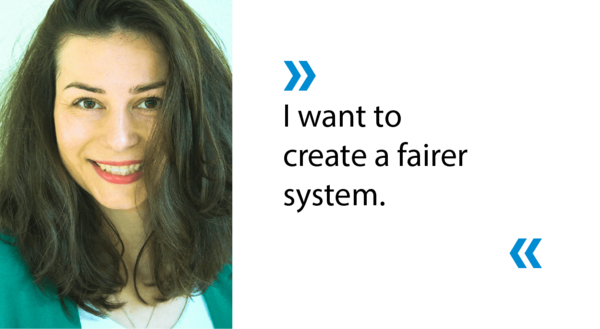Short portraits
February 11 is the International Day of Women and Girls in Science. The UN uses it to promote gender-equal access to careers in science. The Thünen Institute supports this cause. To promote gender equality and family-friendliness in the workplace, we have also been participating in the "audit berufundfamilie" since 2021.
On this page, female scientists and technicians at the Thünen Institute provide insights into their work. The examples are intended to encourage women to pursue a career in science, but not to hide the sometimes difficult working conditions.
On January 1, 2025, there were 1,180 employees, 631 of them women. Of the 185 employees in leadership positions, 31.9 percent are currently women.
This year we are presenting four female scientists who are working on women in rural areas.
Women in science - further portraits
Expert in global beef production and language talent.
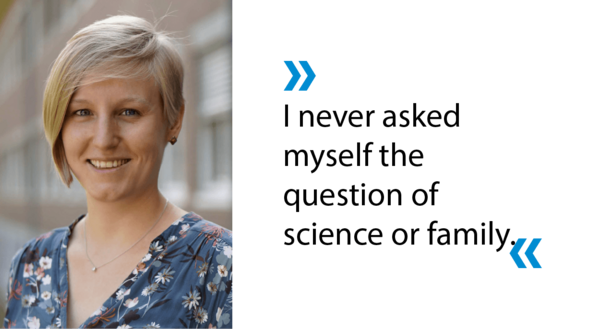
She speaks four foreign languages, two of which are fluent. "Thinking outside the box has always appealed to me," says Katrin Agethen. Travelling and agricultural processes have been her passions since her childhood on a farm in East Westphalia. During her studies and in her first job, she therefore always seizes the opportunity to go abroad. Stays in France and Brazil strengthen the desire to expand her international network and to engage even more specifically in global agricultural research.
This wish brings her to the Thünen Institute of Farm Economics in 2018. First, the doctoral student pursues the research question of how global beef production can function in the face of current climate issues and political requirements. Since 2020, she has been researching these questions on a permanent position.
Professionally and privately, joining the Thünen Institute marks the beginning of an eventful time for the young scientist. Travelling to conferences and stays abroad are part of her work and therefore also part of her life. This now also includes a child. Does it work to combine international research and family? She never asked herself this question. "I set new priorities and found a balance. It's important to know what you want yourself and then you'll find a way!" New tasks with personnel responsibility at the institute are among the most recent, welcome challenges for Katrin Agethen.
Tree researcher, wood detective and liaison officer at the Großhansdorf site.
What wood is this made of? Dr Céline Blanc-Jolivet can answer this question. Like a detective, she determines the origin of wood using DNA tests in the laboratory. In addition to this practical side, she also conducts research at the Thünen Institute of Forest Genetics in numerous projects, such as ForGer, on the conservation of genetic resources of trees as an important factor in climate adaptation. Updating methods constantly and feeding large databases takes time and requires a good overview.
She also has to maintain this overview at home, where she manages her family of five. For Céline Blanc-Jolivet, one thing was always clear: ‘I want to be a scientist and be there for my children’. In order to keep up with her projects, she took her first child to the office with her. ‘That was new for everyone and an unusual situation. But I was able to show that being a mother and doing research works!’ She is keen to set such examples and thus pave new paths for her colleagues. That's why she has also volunteered as a shop steward at the Thünen-Institute in Großhansdorf. She formulates more flexible parental leave requirements, better home office options and a greater leap of faith as goals for female scientists with children. ‘Corona has improved options for working from home, but a lot still needs to happen before a CV like mine is taken for granted.’
Céline Blanc-Jolivet comes from Fontainebleau near Paris and studied agricultural sciences in Montpellier. She completed her doctorate in 2006 in Switzerland, specialising in ecology and evolution. She has been working at the Thünen Institute of Forest Genetics since 2007.
The researcher at the Thünen Institute of Market Analysis lives on two continents.
Mavis Boimah has just spent a month with her family in Ghana. For the past three years, she has been living two lives: her professional life in Braunschweig at the Thünen Institute of Market Analysis and her family life in Ghana. In fact, she regularly commutes between Ghana, Germany and Senegal, which she visits regularly for the IMMPEX project, just like her home country. On the ground, she interviews poultry and dairy value chain actors and stakeholders, as well as consumers, with the goal of understanding the impact of dairy and poultry imports on developing countries. The data form the basis for advising, for example, the German Federal Ministry of Food and Agriculture on international trade policy.
"I've always wanted to make a bigger contribution to evidence-based policy solutions to the world's most pressing problems - climate change, sustainability and fairness in global agriculture. It's just a shame that my family doesn't live in Germany, too." Her husband and three children live in Accra, Ghana's capital city. Mavis Boimah studied agricultural economics there and then earned her doctorate. She sees her family for a month about every six months. Back in Braunschweig, she participates live in family life every day thanks to video chat.
Even though the goodbyes and long periods of separation are hard, she sees the positive: "I can pursue my dream job. And I appreciate the fair and clear structures in Germany. My path is also a valuable experience for the whole family." Despite the challenges, she can imagine continuing to work in Germany. "In the best case, as a family. It would be great if there was more support for raising families.
My advice to "Women Science": don't underestimate yourself! Build confidence, connect with other women in the field who you see as role models, and celebrate every milestone. Every contribution, no matter how small, is important to science. Balancing family life and career is difficult, but with good prioritization, you can find a good balance."
Expert on plastic in the environment
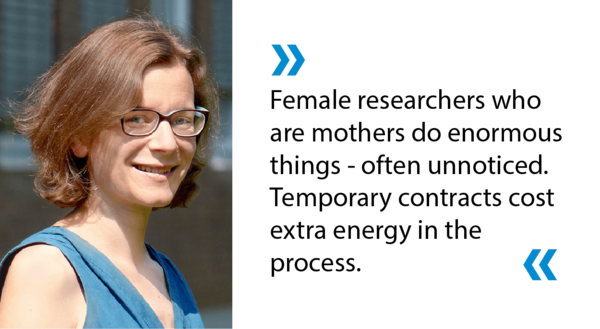
The topic of water protection, which brought her to the Thünen Institute of Rural Studies as a scientist in 2017, has opened up a whole new field of work for Elke Brandes over the past five years. Today, the biologist with a PhD is an expert in the still fairly young research area of plastics in the environment.
The MicroCatch_Balt and PLAWES projects, which she has been supervising since 2017, came to an end last year - with exciting findings. For the first time, the spatial distribution of microplastic inputs into agricultural soils was estimated; nationwide and in detail for the Weser and Warnow river basins. Elke Brandes also uses social media to share her scientific findings and network. To enable her to continue researching the topic of microplastics, she recently submitted a project proposal to the DFG.
Science or business? Elke Brandes knows both sides. After earning her doctorate in 2007 at the Institute of Forest Botany and Tree Physiology at the Albert Ludwigs University in Freiburg, she worked for medical companies for several years. In 2013, however, she returned to research. Before joining the Thünen Institute, she conducted research at Iowa State University in the USA on the effects of diverse agricultural landscapes on the environment and the profitability of farms.
Scientist and laboratory manager at the Thünen Institute of Climate-Smart Agriculture

Stable isotopes are an integral part of Caroline Buchen-Tschiskale's research life: the 36-year-old heads the laboratory for the analysis of stable isotopes at the Thünen Institute of Climate-Smart Agriculture. She specialises in the analysis of isotope abundances in air, water, soil and plant samples. The stable isotopes studied herehelp to improve our understanding of processes in the fields of carbon dynamics and formation of greenhouse gases in soils.
The agricultural and environmental scientist already focussed on stable isotopes in her master's thesis as part of a DFG research group in the Philippines. Her PhD project, which also included field trials with the Lower Saxony Chamber of Agriculture, took her to the Thünen Institute. Here she investigated nitrogen dynamics and their gaseous losses in the form of nitrous oxide (N2O) and di-nitrogen (N2) during grassland renewal and ploughing using stable isotopes. She then moved to ZALF - as head of the stable isotope laboratory. "I defended my dissertation on Fridays and started to work in Müncheberg on Mondays," the scientist remembers. Two years later, she returned to the Thünen Institute to coordinate the GülleBest project.
In May 2021, she she became as head of the stable isotope analysis laboratory and has been a permanent employee since then. "I can organise my work with maximum flexibility, which is what I like about the Thünen Institute," says the scientist, who works three days a week in Braunschweig and two days from home. If necessary, however, she also travels to the lab on a home office day, because regular dialogue with her team is very important to her: "It's the only way to make the lab and the teamwork work."
Despite the lab work, Caroline Buchen-Tschiskale still works as a scientist on various projects - currently on two BLE and one DFG project, among others. "The great thing about my job," says the scientist, "is that, unlike most lab managers, I'm not just responsible for the analyses, but can accompany the sample from its collection in the field to its data evaluation."
KIDA-Manager and family person

When it comes to questions about artificial intelligence (AI), Nathalie Gottschalk is the right person for researchers. Networking, pooling AI knowledge and thus making working life easier for scientists are among her tasks as head of the KIDA project based at the Thünen Institute.
"Since I've had the full-time job, my husband and I have swapped roles - he works part-time and takes much more care of the children and household," says the 36-year-old mother of two. The fact that fathers of young children take on more care work than mothers is still not a matter of course: "Mothers at the nursery often react with surprise when I say that dad does it for us when I ask for an appointment for my daughters. We arrange childcare on an equal footing and as flexibly as possible."
After studying food technology in Berlin, she moved to Braunschweig with her partner, began her doctorate in process engineering at the Technische Universität and had her two children. "A university lecturer once said that the doctoral period is the best time to have children. I wouldn't subscribe to that today," says Nathalie Gottschalk looking back. She is one of the few mothers to manage the balancing act between a part-time PhD and raising children, including two periods of parental time. Her husband supports her and, for example, traveled abroad with her breastfeeding child to the project meeting. It has always been clear to her that it is possible to be committed to her career AND be a good mother - whether part-time or full-time.
What would she like to see for "women in science" with young children? "More acceptance among mothers, sufficient childcare options and less prejudice on the part of employers! In job interviews, I was often asked how I was going to manage with small children, but my husband never was."
Cruise leader of the Baltic Sea Sprat Acoustic Survey
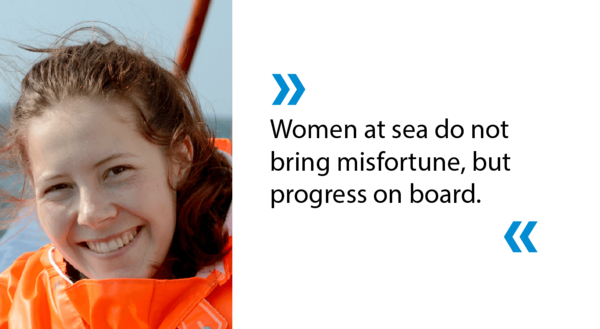
When a young female scientist on a commercial fishing vessel leads one of the most important research cruises of the year - it's still not an everyday occurrence. In 2021, fisheries biologist Stefanie Haase (27) from the Thünen Institute of Baltic Sea Fisheries led the International Baltic Sea Sprat Acoustic Survey as cruise leader on the most modern vessel in German fisheries, the Kristin.
To counter prejudices against women on board, she has been helped by clear announcements and a great deal of knowledge. She also contributes this to two ICES working groups on stock assessment of Baltic Sea sprat. The fisheries biologist has been active at the Thünen Institute of Baltic Sea Fisheries since her first internship at the age of 14. And she is no longer an exotic figure in fisheries research there, where female scientists now hold 50 percent of the positions.
Stefanie Haase has written a sea blog about her experiences on the fishing vessel.
The balance comes with enjoying your job and family.

Water management and land use, climate change and strategies for adaptation in agriculture - Dr Claudia Heidecke has been dealing with these essential issues of our time for several years. As deputy head of the staff unit, she uses her expertise to provide policy advice.
"This interface function between research and policy has always particularly interested me. It is challenging because I am often confronted with a variety of topics at the same time," reports the scientist.
She continued her scientific career at the Thünen Institute after completing her doctorate at the University of Bonn in 2009. Initially, she mainly focused on issues relating to land use and water management in agriculture. Over time, topics such as climate adaptation and climate mitigation were added. These topics are now focused on in a European and international context. This also includes providing technical support for the Ministry at the annual international climate negotiations.
Management tasks, business trips, academic work and family life with three children demand time and energy. "The family and the job are incredibly fun. With the understanding at the institute and in the team and with the support of my family, everything somehow fits under one roof. That's why it usually works out quite well," she says. You have to accept that you don't always fulfil all expectations. For example, children sometimes get sick and then you have to reorganise.
In the early years, it was helpful to have the kindergarten on the institute's premises. "Without good, reliable childcare from an early age, I don't think it's possible for both parents to work full-time," she says. Meanwhile, working from home makes time management easier in everyday life. However, working after 9 pm is not possible. A regulation that doesn't quite fit with reality for Claudia Heidecke: "My working day often continues when the children are asleep."
Mediator between computer science and information.
Everyone at the Thünen Institute probably knows the woman with the pink cat ears on her headphones: when things get stuck on the website, Dana Heinemann knows where the tick is missing. She is the master of the editorial system and often enough a savior in times of need, a mediator between IT and information.
Originally, the Wolfsburg native wanted to catalog and manage books. And because she is passionate about the natural sciences, the library of a research institute was exactly the right place for her to work. But even during her training as a specialist in media and information services, it became clear that the library sector would have to make the leap into the digital age. In addition, Heinemann's training ended just as the Thünen Institute was being founded and a new website was due. She switched to the IT sector. Since then, she has been training the web editors and, among other things, ensuring that the website is accessible - all online. “Sometimes I miss the public,” says Dana Heinemann. “But in theory, 100 web editors can call me every day.”
It is important to her that she can continue to develop despite always working for the same employer. She studied media science and communication design while working. She managed the second relaunch of the website as project manager. However, a lot of what she knows she taught to herself and through professional exchanges in forums. “I appreciate the creative freedom and flexibility of the research business,” she says.
Dana Heinemann is still an exception in the IT sector: only just under 17 percent of jobs in Germany are held by women. This puts our country in the middle of the OECD countries. At least Dana Heinemann has a female boss. At the Thünen Institute, the Center for Information Management is headed by a woman.
Trainer of chemical laboratory technicians.
Research in chemistry was always her dream. In a way, Marina Heuer has fulfilled this dream. As a trainer of chemical laboratory technicians, she has been imparting her knowledge to trainees for the past eight years. “What I particularly liked about this job was encouraging and challenging young people. And, of course, the research as part of the doctoral projects,” she says. She will retire in summer 2023.
As a schoolgirl, she would never have believed that she would gain a foothold at a research institution like the Thünen Institute after all. In the early 1980s, she abandoned her wish to study chemistry and instead trained as a chemical laboratory assistant and worked in the field of environmental chemistry. “I was afraid of it. Studying chemistry was a male domain back then. In general, I've noticed throughout my life that girls and women are reluctant to aspire to leadership positions or a career in science. But they can do it just as well!”
At the Thünen Institute of Agricultural Technology, she initially created the training framework for chemical laboratory technicians from 2009. “The gender ratio of candidates was always balanced and there were always many women among the doctoral students,” she reports. The last of Marina Heuer's trainees took their final exams in 2022. “The apprenticeship will no longer exist in its current form. However, I can imagine that a new training program will be formed under the dedicated, female leadership of the institute, but this time with a digital focus.”
What would she like to pass on to “Women in Science”? “Not only to be hard-working, but also visible. And to stick together as women in science, regardless of whether they have a degree or not, with or without children, with or without a husband or wife.”
First female driver at the Thünen Institute

Reliable and relaxed, Babette Kania takes the President and other employees to their destinations. Her workplace is the President's company car, a well-maintained black Mercedes 300E. Babett Kania has been the first female driver at the Thünen Institute since 2013. She is familiar with being the only or one of a few female colleagues from her previous jobs as a driver at the Max Rubner Institute in Kiel or on behalf of the Berlin Chancellery.
"After school, I actually wanted to join the navy on a merchant ship," says the 61-year-old from Potsdam, who grew up in the former GDR. "But I wasn't allowed to because I had relatives in the West." Instead of going on board, she did an apprenticeship as a baker, got married, had her daughter and cherished a new dream: driving buses.
Dreamed of, done: in her early twenties, she completed her driving license for trucks and buses, later training as a professional driver and gaining experience at the wheel of trucks and construction vehicles. After the fall of the Berlin Wall, she conquered the whole of Europe as a young coach driver. She drove to sunny Mallorca, Italy and the snowy Swiss mountains.
Her professional highlights include coach trips abroad, a trip with the then Minister of State for Culture Bernd Neumann and trips abroad with the Thünen President to meetings in Sweden. "There's never a dull moment in science. I once picked up researchers from the peatland near the Dutch border in the evening."
35 years in 40-ton trucks, coaches and company cars and accident-free - apart from one wildlife accident - an impressive record. What can actually upset this calm, frequent driver? "Very little! But the traffic on the left in England - I'm glad I haven't had to do that yet!" she admits with a laugh.
Pioneer in the field of plant genetics.
Trees have fascinated Birgit Kersten since she was walking in the woods as a child. This interest led her to study biology in East Berlin in the 1980s. At the same time, she had her two children. "In the GDR, it was common to start families at an early age. Due to the existing childcare, this was easily doable!" She has therefore never given up on science. The children have meanwhile moved out. The objects of her research remained. Since 2010, she has been working at the Thünen Institute of Forest Genetics, for example in the TaxGen project, which is about decoding the genome of the European yew (Taxus baccata). The molecular biologist is particularly interested in the genetic basis of sex determination. In this field, she has done real pioneering work in the study of the poplar genome. Together with two colleagues, she received one of the Thünen Research Awards 2021 for this.
She was already a pioneer in research – during her post-doc project in the field of plant protein chips at the Max Planck Institute (MPI) for Molecular Genetics: "In 2005, we were the first to present results in this field and published them before our American colleagues!" In 2006, Birgit Kersten switched to plant bioinformatics and took over the management of the GABI Primary Database at the MPI of Molecular Plant Physiology.
Upheavals after the fall of the Berlin Wall in 1989 and obligations in her job and family caused delays in her research career. In 2000, she completed her doctorate at the Charité hospital in Berlin. 17 years later, she habilitated at the University of Potsdam. "Fortunately, I always had mentors, colleagues and superiors who supported me!"
After numerous temporary projects, Birgit Kersten appreciates her permanent position as a research assistant. She also teaches as a private lecturer at the University of Hamburg. "I find the apprenticeship exciting. And it officially entitles me to supervise doctoral candidates externally."
Research is what I like to do.

Women and forestry work - especially in the Global South countries, this is a challenging constellation: women often work without a contract or social security and for a lower wage. At the Thünen Institute of Forestry in Hamburg-Bergedorf, Dr Rattiya Lippe is developing methods that can be used to estimate the number of employed persons in the global forestry sector. Her research further focuses on analyzing the decent working conditions of the forestry workforce.
The fact that the forestry sector has become her field of research also has to do with the time-limited position of scientific contract. Born in Thailand, she completed her doctoral degree in agricultural economics in Bangkok. The associated project focused on consumer preferences for fruit and vegetables and the household consumption expenditure. It was funded by the German Research Foundation (DFG) through the University of Hohenheim. After completion of her doctorate, she lived in Germany and worked as postdoctoral researcher at Leibniz University Hannover. "For four years, my husband and I commuted between Stuttgart and Hanover. It was very exhausting," she says. The only thing that made the situation easier was mutual understanding.
After the postdoc phase, the time of fixed-term employment contracts in academia came to an end. Rattiya Lippe made a brief stay into the private sector before finding a position at the Thünen Institute of Forestry in 2020. "I'm an economist and I want to continue with research. That's what I like to do, she says." Making a career in science is challenging for women in some places even more so than for men. For example, conducting field research in some countries may require women to prepare more for safety reasons. But: you grow into these careers - if you like what you do.
Institute Directors at the Thünen Institute
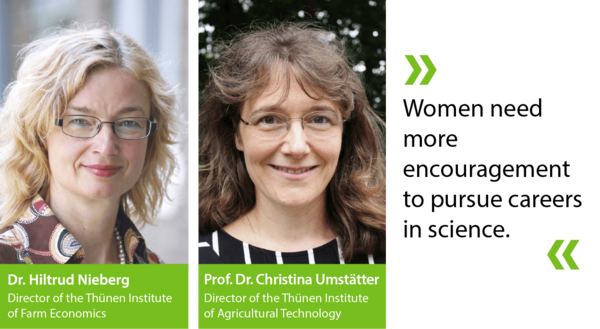
Hiltrud Nieberg (60) and Christina Umstätter (48) head two of the 15 institutes at the Thünen Institute. The proportion of women among their scientists varies greatly. In the Thünen Institute of Farm Economics, which Hiltrud Nieberg has headed for twelve years, the proportion is almost 50 percent. In the Thünen Institute of Agricultural Technology, which Christina Umstätter took over in 2021, there are only two women among eleven scientist colleagues with permanent positions.
Agriculture still seems to be a male preserve. 36 percent of employees in German agriculture are female, according to the agricultural census. But only one in nine farms is run by a woman. However, the figures in the agricultural statistics do not do justice to the actual role of women in agriculture. This is shown by the initial results of the study on the living and working situation of women in agriculture, which is being conducted jointly by the Thünen Institute and the University of Göttingen.
In science, the picture is similar: It is true that many women study agricultural sciences, the proportion is about half of the students. But the higher the position, the fewer women are still visible. "Men also dominate agricultural committees, and in discussion events or meetings I am often one of the very few women," says Hiltrud Nieberg. However, she has also participated in committees such as the Future Commission for Agriculture and has been a member of the Scientific Advisory Council for Agricultural Policy, Nutrition and Consumer Health Protection at the BMEL for many years - committees that already have almost equal representation.
According to Hiltrud Nieberg and Christina Umstätter, promoting women in science means, above all, encouraging women to choose and qualify for a career in science. "Women need to be encouraged much more in their self-confidence; they too often doubt their abilities," says Christina Umstätter, who would like to see more creative leeway in filling new positions. This would benefit the higher qualification of women.
Both institute directors see their own position as an important role model. Their message to young female scientists: "Have courage, always be curious and don't let old role models stop you from pursuing your goals."
Heads of finance department

Carolin Nodewald has been involved in research her entire professional life. However, from a different perspective than her colleagues in the institutes. She has been Head of Finance at the Thünen Institute for 15 years. She has even been familiar with the figures and balance sheets of a sub-division since 2005, long before the Thünen Institute existed.
Immediately after graduating with a degree in administration, the then 21-year-old took over the management of the budget of the Bundesforschungsanstalt für Forst- und Holzwirtschaft (BFH) - the predecessor institute of today's four forestry and timber institutes. "Unusual, but a great opportunity that I seized. Fortunately, I was supported by my team. Even when I suddenly lost my job three years later."
In 2008, the BFH, the Bundesforschungsanstalt für Landwirtschaft (FAL) and the Bundesforschungsanstalt Fischerei (BFA-FI) merged to form the Thünen Institute with its headquarters in Braunschweig. The then 24-year-old reoriented herself, developed new structures for the finance department such as the travel expenses office in Hamburg-Bergedorf and networked for six months at the BMEL in Bonn.
When she was offered the position of Head of Budget Unit for the entire Thünen Institute in 2009, she became pregnant for the first time. Without hesitation, her partner follows her a second time and takes over her parental leave. "We thought it would work out somehow!" In her new dual role as a manager and mother, she struggles with prejudices and role models for the first time." As a part-time dad, my husband had a hard time and for many people around me, it was frowned upon not to be with the baby."
However, she kept her eye on the road ahead, got her team behind her and had two more children. Would she do anything differently today?" No, but I also have self-doubt. Women are always more worried than men."
Specialist for wood species identification in fibers and paper
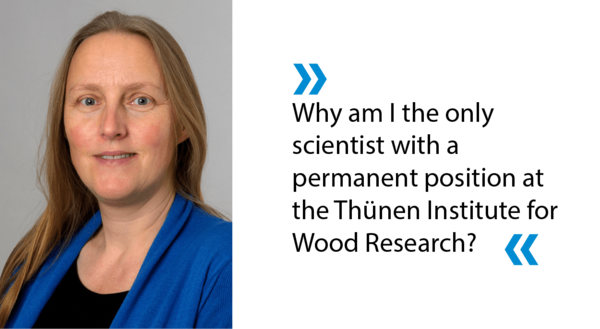
Before Andrea Olbrich moved from Göttingen to Hamburg to start a family, she asked herself one question, not without concern: What's next for her profession - as a biologist with a doctorate in botany and microscopy? Olbrich has found her new home in wood species identification at the Thünen Institute of Wood Research. Alongside 12 colleagues, she is the only scientist with a permanent position.
Andrea Olbrich works in wood species identification and as head of electron microscopy. Her research area is wood species identification in paper and fiberboard. The biologist has brought the method to the Thünen Institute and built up new references there, which now help to identify illegal wood even in fiber materials. Her latest project: to automate wood species recognition using AI systems.
Before joining the University of Hamburg and the Thünen Institute, Andrea Olbrich worked in the scientific service of the Department of Forest Botany and Tree Physiology at the Büsgen Institute of the Georg August University in Göttingen. From 1994 to 2000, she studied biology at the Georg-August University of Göttingen, and in 2004 she completed her doctorate at the Ruprecht-Karls University of Heidelberg.
More information on the topic of wood species identification can be found on the pages of the Thünen Centre of Competence on the Origin of Timber.
Part time deputy
For a long time, Dr. Janine Pelikan from the Institute of Market Analysis was the only deputy director in one of the 15 Thünen Institutes. For a few weeks now, she has had a colleague in Dr. Anja Kuenz at the Institute of Agricultural Technology. "I really enjoy the scientific work. And I enjoy being with my colleagues," says Janine Pelikan. But she emphasizes, "I also have a family that is a great support to me and provides a balance to the many challenges. It helps me to do a good job. Balancing my family and work is very important to me."
To ensure that the balance succeeds in everyday life, the family work is divided equally between the shoulders of father and mother. Her husband, also a scientist at the Thünen Institute, works part-time like Janine Pelikan. They both watch each other's backs so that, for example, business trips lasting several days are possible. "Of course, there is always a bit of time missing somewhere," says the agricultural economist, whose research area is international agricultural trade. Basically, she says, the good cooperation with Institute Director Dr. Martin Banse and with the team at the Institute of Market Analysis is important for her work. More women than men work there, and overall there is a great diversity in terms of age structure and nationalities among the employees. "This diversity enriches the work and promotes understanding for a wide variety of lifestyles," says Pelikan.
Before Janine Pelikan came to what is now the Thünen Institute in 2004, she studied agricultural sciences in Kiel and environmental economics for one semester in Norway, and earned her doctorate in Giessen. While she was still working on her doctorate, the then director of the institute and current president of the Leibniz Association, Prof. Dr. Martina Brockmeier, offered her a permanent position. For Janine Pelikan, her former boss is still an important role model today.
Equal Opportunity Commissioner for more than 20 years

Birgit Rönnpagel knows almost everyone who is hired at the Thünen Institute. As Equal Opportunity Commissioner, one of her most important tasks is to ensure that all applicants are treated equally in job interviews. The workgroup manager now has more than 20 years of experience as an Equal Opportunity Commissioner at the Thünen Institute, in addition to her main job at the Center for Information Management.
What has changed during this time? "Unfortunately little, women are still underrepresented in senior positions at the Thünen Institute," says Birgit Rönnpagel. There are many reasons for this: work-life balance, part-time work and the fact that women are less likely than men to apply for management positions. Birgit Rönnpagel and her deputy want to discuss this and other topics with the Thünen Institute's female employees in various workshops from fall 2024 and develop ideas on how job advertisements can be made more women-friendly and how potential female applicants can be encouraged to take on management responsibility. Together with a gender equality plan for the Thünen Institute, which provides for concrete measures to promote gender equality and is to be updated shortly, Birgit Rönnpagel hopes that the underrepresentation of women can be visibly reduced in the coming years.
The forest adaptation expert knows how the trees are doing
When trees talk, they talk to Dr. Tanja Sanders: In the Brandenburg forest, there are trees that report daily to the scientist and her 17-member team at the Thünen Institute of Forest Ecosystems how they are doing. One of these trees even published its condition via Twitter for a while. Among other things, methods for electronic data transmission, but also remote sensing via drone and satellite, are being tested at the intensive measurement site in Britz.
Knowing how the forest is doing has become essential in times of climate change. Which tree species are adapting to the changes, and how quickly? Sanders, a geographer and sociologist, has been working on these kinds of questions about forest adaptation for her entire research life. Yet she actually wanted to go into development aid or to work for a newspaper. "I wanted to make a difference either way," she says. Then, however, the trees found her. After graduating, she moved to the United Kingdom to help set up a tree ring lab and begin her doctorate. Since 2011, she has been working at the Thünen Institute for Intensive Forest Monitoring, and since 2018 as the head of the Ecology and Forest Dynamics Unit.
Tanja Sanders has successfully made a career in science, although she has raised her two sons alone for stretches. She takes a critical view of the conditions for this: "Women are qualified enough, but working in science companies is uninteresting, too many business trips, too many evening appointments, too many things to keep in mind at the same time." Most family work still falls on mothers, he said. At the same time, women and careers are a difficult duo. "Women tick differently than men. They rarely actively position themselves for a leadership role," Sanders says. That's why she tries to make men aware not to overlook women and actively motivate them to make career leaps. That's why she also gets involved with young people, she says, imparting knowledge about her research to them, whether live on site or via video chat. Tanja Sanders wants to make a difference, still.
About the diversity of the potato to biodiversity monitoring
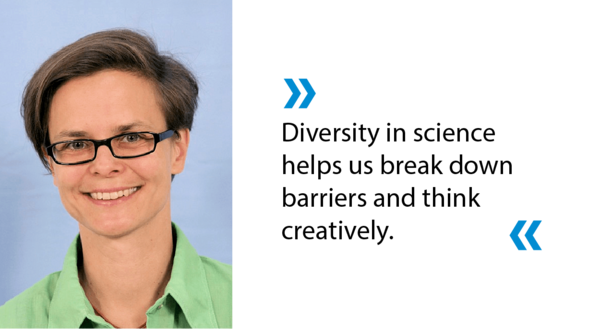
Through the diversity of the potato and smallholder livelihoods, which she has researched primarily in South America, Africa and Europe, geoecologist Diana Sietz has become a specialist in the interactions of biodiversity, food and climate, and agroecological transformation. As such, she is one of the main authors of the Nexus Assessment of the World Biodiversity Council IPBES. She also leads the Archetype Analysis in Sustainability and Land Governance Research working group of the Global Land Programme. Her research has taken Sietz to the Potsdam Institute for Climate Impact Research (PIK), the UN University - Institute for the Advanced Study of Sustainability in Japan, the International Potato Center (CIP) in Peru and Wageningen University.
With her expertise in biodiversity and policy advice, the researcher is helping to develop biodiversity monitoring for agriculture at the Thünen Institute of Biodiversity.
Work group leader in a man's world
Her path as a scientist opened up on a Portuguese fishing boat: "On the trips, I understood what it meant to make a living from fishing," says Dr. Sarah Simons. During her master's thesis at NOAA's renowned Northeast Fisheries Science Center in the U.S., she worked on bycatch avoidance in fisheries. After two and a half years abroad, she finally returned to Germany and became one of the first doctoral students at the Thünen Institute of Sea Fisheries. The result of her PhD was an innovative modeling approach that is currently being applied in international bodies for climate change impact assessment and future management measures. Since 2020, she has been a working group leader at the Institute of Sea Fisheries, primarily responsible for economic and social analyses in the fishing industry. "Finding topics that could become relevant and also doing application-oriented research - that's just my thing," says the scientist.
The start as a manager was anything but easy: Sarah Simons took over the position during the Corona pandemic and after her second parental leave. Individual coaching, flexible working hours, home office and consistent division of labor at home help her master the task. "As a mother of young children who works full time, I am an exotic in the neighborhood. And so is my husband, because we share the family chores fifty-fifty," she says with a laugh.
Her working group has grown quickly - the need to make the fisheries sector sustainable and bring environmentally friendly solutions into practice is greater than ever. "I'm proud to lead such a diverse team. We are 13 bright minds from young to experienced, men and women from diverse disciplines, from biology to social science," reports Sarah Simons. When she is deputized, she likes to rotate the deputies. That way, everyone takes responsibility for the working group and everyone has the same level of knowledge. She says she learned this from the U.S., where young people have much more equal rights in the scientific community than in Germany. Her motivation behind all this: "I want to create a fairer system.






